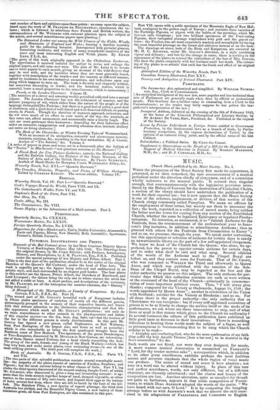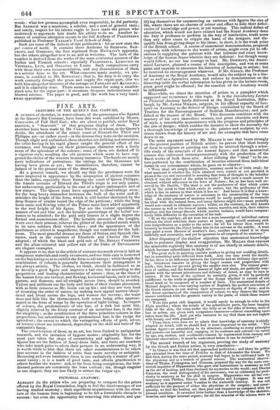M U S IC.
Church Music published by the Motet Society. No. I.
WHEN the prospectus of the Motet Society first made its appearance, it presented, as we then remarked, the rare announcement of a musical periodical under the direction chiefly of clergymen, and of a committee wholly unknown to the musical public. It seemed then singular enough, that contemporaneously with the legislative provision intro- duced by the Bishop of LONDON for the destruction of Cathedral Choirs, a section of the clergy should have undertaken the publication of a work for their especial use: but it now appears that the Motet Society is one of the schemes, implements, or devices, of that section of the Church clergy commonly called Puseyites. We mean no offence by the employment of these terms, but merely use them to announce the fact ; the work, regarded as a collection of sacred music, being neither the 'better nor the worse for coming from any section of the Established Church, whether the same be legalized Episcopacy or legalized Presby- terianism. Its intention, as announced, is to "furnish Anthems for the Festivals, from the commencement of the ecclesiastical year to Inno- cent's Day inclusive, in addition to miscellaneous Anthems; then to proceed with others for the Festivals from Circumcision to Easter "; and so on, we presume, through the year. We speak under correction, but this appointment or selection of anthems for certain days is surely an unwarrantable liberty on the part of a few self-appointed clergymen. We know no head of the Church but the Queen ; who alone, we ap- prehend, has the power to appoint certain anthems for certain days, and to order what shall be said and what sung. Several editions of the words of the Anthems used in the Chapel Royal are before us, and they contain none for Festivals. That of Dr. Caorr, who was composer to Wrtusin the Third and afterwards to Queen ANNE, and which was published with the sanction of the Sub- Dean of the Chapel Royal, may be regarded as the best and the safest authority we possess on this subject. The only anthems for par- ticular days which this collection contains are such as were written at the command of the head of the Church—principally in commemo- ration of some important political event. Thus, "I will alway give thanks ; composed for the Victory at Oudenarde, August 19, 1708; the words appointed by Queen Anne"; another in celebration of the Union with Scotland ; another for the Victory at Blenheim ; and so on. For all these there is the proper authority—the only authority that as Churchmen we can recognize : but if every self-appointed committee of priests is to be at liberty to change the service itself or the mode of its performance, we ask where are these innovations to stop, and of what force or avail is that statute which gives to the Church its uniformity? In several instances the editors of this publication have exhibited as little good taste as decorum in their innovations. There is something ridiculous in hearing these words made the subject of a fugue, as well as presumptuous in recommending that to be sung which the Church ordains to be read- " Almighty and everlasting God, who for the more confirmation of our faith didst suffer thy holy Apostle Thomas [here a bar rest] to be doubtful in thy Son's resurrection," &c. &c.
Such words are not fitted, nor were they ever designed, for music. A more wanton musical desecration is committed on FARRANT'S "Lord, for thy tender mercies sake" ; a composition which, in addition to its other great excellences, exhibits perhaps the most faultless accent and accurate emphasis that the whole region of vocal music can produce. The union of sound and sense is here absolute ; not note or a word can be altered without injury. In place of this rare and perfect accordance, words, not only different, but of a different
character, are clumsily substituted ; and the charm and beauty of the composition are lost. Another alteration, quite as uncalled-for though not quite so barbarous, appears in that noble composition of PALES-
TRINA to which Dean ALDRICH adapted the words of the psalm, "We have heard with our ears, 0 Lord." It is by comparing the bungling attempt before us with ALDRICH'S work that we discern the skill exer- cised in his adaptations of PALESTRINA and Cameral to English
words : what few persons accomplish even respectably, he did perfectly. But ALDRICH was a musician, a scholar, and a man of general taste ; and surely, respect for his talents ought to have made the person who undertook to supersede him doubt his ability to do so. Another in- stance of needless alteration occurs in the full Anthem of PALESTRINA published in Professor TAYLOR'S Vocal Schools of Italy.
Such are some of the defects of this publication : let us now state the per contra of merit. It contains three Anthems by REDFORD, Ban- cnorr, and GIBBONS; the first reprinted from HAWKINS'S appendix, but the others altogether new to us, and as welcome. The bulk of the number is derived from the works of the most celebrated masters of the Italian and Flemish schools ; especially PALESTRINA, DUDOVICO DI Vicronia, Luer, and ORLANDO DI LASSO. Such compositions carry with them their own recommendation, and any dissemination of them is a service done to the art. What concerns music merely, we pre- sume, is confided to Mr. RIMBAULT; that is, his duty is to carry the work correctly through the press and supply the organ-part, (for we bold him altogether innocent of the outrage on FARRANT and ALnatcE); and it is admirably done. There seems no reason for using a smaller- sized note for the organ-part : it occasions frequent indistinctness and blurred minims. The paper is good, and the work has a very hand- some appearance.



























 Previous page
Previous page